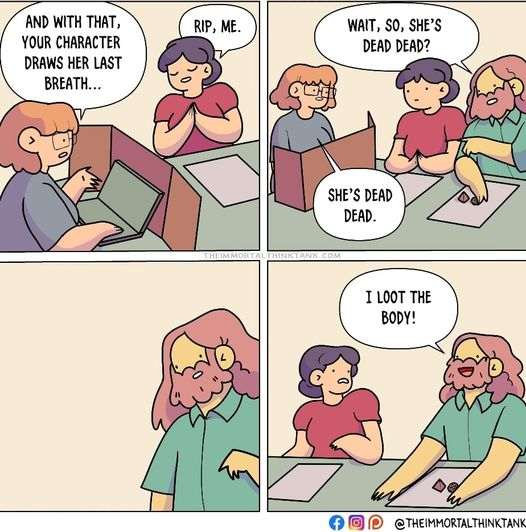So, the algorithm coughed this comic up for me:
This is an example of what can go weird or wrong in RPGs. Let's unpack it.
CONFLICTING EXPECTATIONS
The woman narrating her character's beautiful death is into the Narrative side of things. She gets joy from wrapping up the story she has created through her character.
The man is simply doing the next, natural move in the Game of accumulation. He gets joy from making moves in game that benefit his character, ie acquiring more useful loot.
But as the comic shows in her shocked face and his beaming smile, there is a huge conflict in how they feel about the incident.
WHO IS RIGHT?
Tough question. The game is 'roleplaying', ergo playing your role is what you do. It is also a 'game', and although it breaks many traditional game conventions (ie having a definite goal or end, or having limited moves), making moves is what you do.
HOW SHOULD THE GM RESPOND?
So, we've seen the Narrative take on the situation, as well as the Gamist. Although these two are the central pillars of roleplaying games, underlying both of these are the Simulationist side of the equation. If I were the GM, I would simply let the simulation of the gameworld react to the incident in a natural way.
For example, if the looter were a Good aligned cleric, he might lose his divine gifted powers for desecrating a body instead of giving a decent burial to a comrade. If NPC hirelings were present, they may start to mistrust the desecrating PC and slip away during the night, something native porters have done to imperialists for centuries.
Some may suggest that the GM discuss with the ''offending'' player, but in his ideology he is only doing what is right. I might warn the player about gameworld repurcussions of their acts, but trying to persuade someone their 'fun' is wrong never ends well, in my experience.
Finally, the GM might want to make sure Gamist and Narrativist PCs are not in the same locale or separated by some deux ex machine to let them do their thing. However, this puts lots more burden on the GM and threatens to bore one type of player while the other takes center stage.
This is an RPG conundrum that can never be solved entirely because the tension between Game and Narrative is what makes RPGs work. But both Narrativists and Gamers have agreed to play in the same gameworld sandbox, so it is the GM's job to hold them to this agreement.
EXAMPLES OUTSIDE OF FANTASY ROLEPLAYING
This comic is a narrow example drawn from the specialized genre of D&D and its derivatives. What about other genres?
Horror - As I related before, players in games like Call of Cthulhu often arm up heavily even before any sign of trouble. This is not how horror movies or novels go. Make sure first that your players are onboard with the genre - horror is all about being powerLESS. If people want to power game, maybe play something else. Also, if they are waving heavy weapons around, make sure NPCs will run or call the police. As I suggested HERE, you can limit PC access to weapons based on the threat level & their experience to better simulate the genre.
Supers - In superhero games, the monologue of the villian is a Narrative trope, but in Gamist terms it is an excuse for a free attack. Remind players in advance of genre tropes (ie monologues go uninterrupted, heroes are captured not killed), but if players choose to ignore them and become unscrupulous, have the villains do the same and switch to sneak attacks or swarming and doxing with intent to kill.
RESUME
1) Explain genre tropes BEFORE starting the game so everyone is on board.
2) If a conflict occurs, let the gameworld react realistically to it.
3) Be prepared for the game to either fall apart or be strengthened by the experience.

Just before I got to your "How Should the GM Respond?" paragraph, I had the same thought. Simulating the world will provide consequences for the gamist looter, which if played right, can make the game more fun, rather than be seen as a punishment.
ReplyDeleteSide Note: In our CoC game last night, my PC and another finally went insane. We were pushing the Keeper a bit, since he seemed a little reluctant to spring consequences on us. It was a blast!
I knew you'd get it, Dennis. No consequences is a bit too millenial participation award for me.
DeleteAll good advice.
ReplyDeleteCheers Gordon!
Delete